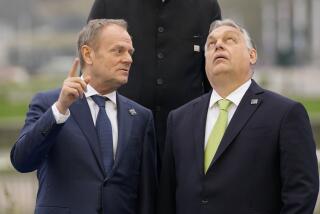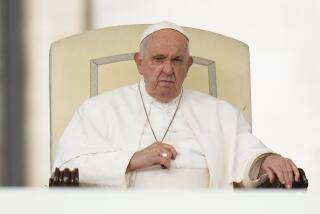Pope Delivers the Message
- Share via
Pope John Paul II’s trip to Poland presumably brought diplomatic relations between Warsaw and the Vatican, ardently desired by the Communist regime, a step closer. However, the pontiff, making his third visit to his native land, made it surprisingly plain that formal ties won’t be on the cozy conditions favored by the Polish government.
In Poland, far more than in other Soviet Bloc countries, the Roman Catholic Church has proved to be an indigestible lump. The cathedrals are full of worshipers, young and old. The seminaries can’t accommodate all the young Poles who want to be priests. The church is the institutional embodiment of Polish patriotism.
Solidarity, the independent trade union movement that excited the democratic aspirations of Poles in the early 1980s, has been effectively repressed. But organized militancy has given way to sullen passivity, and the workers’ lack of enthusiasm is stifling the regime’s plans for rejuvenation of the basket-case economy.
Gen. Wojciech Jaruzelski, the chief of state, believes that diplomatic recognition by the Vatican would enhance the international standing of his government, thereby aiding the quest for foreign credits. He also wants to enlist the Pope’s help in promoting a cooperative spirit of “normalization” inside Poland. The pontiff, for his part, is apparently convinced that diplomatic relations with Warsaw could open the way to similar ties with other East European governments.
However, John Paul confounded all those who expected him to counsel patience and spiritual values and avoid overt challenges to the Communists. He publicly challenged Jaruzelski to honor human rights, implicitly blamed communist ideology for the country’s economic problems, denounced political discrimination against private farmers, praised the outlawed Solidarity movement as a model for all human-rights struggles, and indirectly suggested that the relationship between Polish bishops and the regime has been too comfortable lately.
Millions of Poles flocked to his open-air masses--the high point being a religious procession of 800,000 people through the streets of Warsaw to a square that symbolizes Poland’s involuntary subservience to Moscow.
By his outspokenness, the Pope probably gave up any chance of his being invited to the Soviet Union, where his Polish trip was peevishly criticized Monday by Izvestia. The Polish government was visibly irked by the Pope’s pointed remarks, too. But, since Warsaw needs an accommodation with the Vatican worse than the Vatican needs the blessing of Warsaw, talks toward formal ties probably will stay pretty much on track.
John Paul breathed new hope into despondent supporters of Solidarity’s ideals, and put both the Communist regime and the Polish cardinals on notice that, as long as he is pontiff, the church will champion those who work for greater freedom and self-determination in Poland--even when that brings them into conflict with the authorities.
More to Read
Sign up for Essential California
The most important California stories and recommendations in your inbox every morning.
You may occasionally receive promotional content from the Los Angeles Times.













